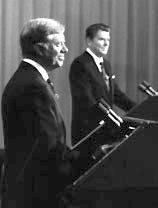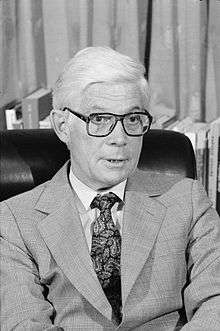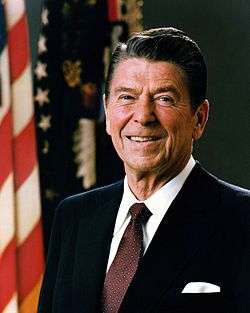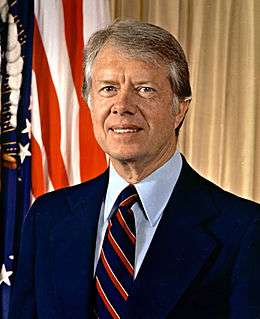United States presidential debates, 1980
The United States presidential election debates were held during the 1980 presidential election. The first presidential debate was held on September 21, 1980 at the Convention Center in Baltimore, Maryland between independent candidate, congressman John B. Anderson and the Republican candidate, former governor Ronald Reagan of California. The second presidential debate, was held on October 28, 1980 at the Public Music Hall in Cleveland, Ohio between the Democratic candidate, incumbent president Jimmy Carter and Reagan. With 80.6 million viewers, it was the most-watched debate in American history until the first presidential debate in the 2016 election. Even though the second debate started at 9:30 p.m. EDT, which was 30 minutes earlier than the first one, both of them ended at 11:00 p.m. EDT. Both debates were organized by the League of Women Voters.
In the first debate, the candidates had up to two and a half minutes to answer each question, along with a one minute and 15-second rebuttal. Closing statements could be as long as three minutes. The second debate consisted of two halves. In the first half, the candidates received the same questions with a maximum of two minutes. Each candidate was given one minute for rebuttal. In the second half, the candidates still received the same questions but without a rebuttal.

In 1983, Reagan's campaign came under fire after being exposed for having access to Carter's internal debate briefing materials.
Participant selection
Three candidates, Jimmy Carter, John B. Anderson and Ronald Reagan, were invited to the first presidential debate. Carter refused to attend, believing that Anderson, the Republican-turned-independent candidate, should not have been included.[1][2]
Reagan's strong performance in the first debate caused Anderson's numbers to drop in the polls. Subsequently, Carter and Reagan were the only invitees to the second presidential debate.[2]
There were no vice presidential debates.[3]
Schedule
The League of Women Voters organized the two presidential debates on the following dates:
- September 21, 1980 at the Convention Center in Baltimore, Maryland, moderated by Bill Moyers of PBS;
- October 28, 1980 at the Public Music Hall in Cleveland, Ohio, moderated by Howard K. Smith of ABC News.
First presidential debate (Convention Center)
The Convention Center in Baltimore, Maryland hosted the first presidential debate.

Illinois

California
Carl Loomis of Fortune Magazine, Daniel Greenberg, Charles Corddry of the Baltimore Sun, Lee May of the Los Angeles Times, and James Bryant Quinn posed questions for the candidates.
Questions for Congressman Anderson
- Mr. Anderson, opinion polls show that the American public sees inflation as the country's number one economic problem, yet, as individuals, they oppose cures that hurt them personally. Elected officials have played along by promising to cure inflation while backing away from tough programs that might hurt one special interest group or another, and by actually adding inflationary elements to the system, such as indexing. They have gone for what is politically popular, rather than for what might work and amount to leadership. My question, and please be specific, is what politically unpopular measures are you willing to endorse, push and stay with, that might provide real progress in reducing inflation?
- Mr. Anderson, I'd like to know specifically, what changes you would encourage and require in American lifestyles in automobile use, housing, land use and consumption, to meet problems that aren't going to respond to campaign lullabies about minor conservation efforts and more production?
- Mr. Anderson, you and Mr. Reagan both speak for better defense. for stronger defense and for programs that would mean spending more money. You do not, either of you, however, come to grips with the fundamental problem of manning the forces, of who shall serve, and how the burden will be distributed. This will surely be a critical issue in the next Presidential term. You both oppose the draft. The questions are, how would you fill the under-strength combat forces with numbers and quality, without reviving conscription? And will you commit yourself, here, tonight, should you become the Commander in Chief, to propose a draft, however unpopular, if it becomes clear that voluntary means are not working?
- Mr. Anderson, let me ask you, what specific plans do you have for Federal involvement in saving cities from the physical and emotional crises that confront them, and how would you carry out those plans, in addition to raising military pay, without going against your pledge of fiscal restraint?
- Mr. Anderson, many voters are very worried that tax cuts, nice as they are, will actually add to inflation. And many eminent conservatives have testified that even business tax cuts, as you have proposed, can be inflationary as long as we have a budget deficit. Now, Mr. Reagan has mentioned that he put out a five-year economic forecast, which indeed he did, but it contained no inflation number. You have published a detailed program, but it too does not have any hard numbers on it about how these things work with inflation. So I would like to ask you, if you will commit to publish specific forecasts within two weeks, so that the voters can absorb them and understand them and analyze them, showing exactly what al these problems you've mentioned tonight - on energy, on defense, on the cities - how these impact on inflation, and what inflation's actually going to be over five years.
- I would point out that churches are tax-exempt institutions, and I'll repeat my question. Do you approve the Church's action this week in Boston, and should a President be guided by organized religion on issues like abortion, equal rights and defense spending?
Questions for Governor Reagan
- Governor Reagan, repeating the question, and I would ask you, again, to engage in as many specifics as you possibly can. What politically unpopular measures are you willing to endorse, push and stay with that might provide real progress in reducing inflation?
- Well, gentlemen, what I'd like to say first is, I think the panel and the audience would appreciate responsiveness to the questions, rather than repetitions of your campaign addresses. My question for the Governor is: Every serious examination of the future supply of energy and other essential resources - including air, land and water - finds that we face shortages and skyrocketing prices, and that, in many ways, we're pushing the environment to dangerous limits. I'd like to know, specifically, what changes you would encourage and require in American lifestyles in automobile use, housing, land use and general consumption, to meet problems that aren't going to respond to campaign lullabies about minor conservation efforts and more production?
- Mr. Reagan, I will just repeat the two questions: How would you fill the under-strength combat forces with numbers and with quality, without reviving conscription? And will you commit yourself; here, tonight, should you become the Commander in Chief, to propose a draft, however unpopular, if it becomes clear that voluntary means are not solving our manpower problems?
- Mr. Reagan, the military is not the only area in crisis. American cities are physically wearing out, as housing, streets, sewers and budgets all fall apart. And all of this is piled upon the emotional strain that comes from refugees and racial confrontations. Now, I'm wondering what specific plans do you have for Federal involvement in saving our cities from these physical and emotional! crises, and how would you carry out those plans in addition to raising military pay, without going against your pledge of fiscal restraint?
- Mr. Reagan, will you publish specific forecasts within two weeks, so that the voters can have time to analyze and absorb them before the election, showing exactly what all these things you've discussed tonight - for energy, cities and defense - mean for inflation over the next five years?
- I'd like to switch the focus from inflation to God. This week, Cardinal Medeiros of Boston warned Catholics that it's sinful to vote for candidates who favor abortion. This did not defeat the two men he opposed, but it did raise questions about the roles of church and state. You. Mr. Reagan, have endorsed the participation of fundamentalist churches in your campaign. And you, Mr. Anderson, have tried three times to amend the Constitution to recognize the, quote, "law and authority," unquote, of Jesus Christ. My question: Do you approve of the Church's actions this week in Boston? And should a President be guided by organized religion on issues like abortion, equal rights, and defense spending?
Transcript
- Debate transcript from the Commission on Presidential Debates website.
Second presidential debate (Public Music Hall)
The Public Music Hall in Cleveland, Ohio hosted the second presidential debate.

Georgia

California
Marvin Stone of U.S. News & World Report, Harry Ellis of the Christian Science Monitor, William Hilliard of the Portland Oregonian and Barbara Walters of ABC News posed questions for the candidates.
Questions for President Carter
- Yes, President Carter, the question of war and peace, a central issue in this campaign. You've been criticized for, in the give and take, for responding late to aggressive Soviet impulses, for an insufficient build-up of our armed forces, and a paralysis in dealing with Afghanistan and Iran. Governor Reagan, on the other hand, has been criticized for being all too quick to advocate the use of lots of muscle - military action - to deal with foreign crises such as I have mentioned. Specifically, what are the differences between the two of you on the uses of American military power?
- I would like to be a little more specific on the use of military power and let's talk about one area for a moment. Under what circumstances would you use military forces to deal with, for example, a shut-off of the Persian Oil Gulf [sic] if that should occur, or to counter Russian expansion beyond Afghanistan into either Iran or Pakistan? I ask this question in view of charges that we are woefully unprepared to project sustained - and I emphasize the word sustained - power in that part of the world.
- Mr. President, when you were elected in 1976, the Consumer Price Index stood at 4.8%. It now stands at more than 12%. Perhaps more significantly, the nation's broader, underlying inflation rate has gone up from 7% to 9%. Now, a part of that was due to external factors beyond U.S. control, notably the more than doubling. of oil prices by OPEC last year. Because the United States remains vulnerable to such external shocks, can inflation in fact be controlled? If so, what measures would you pursue in a second term?
- Mr. President, you have mentioned the creation of nine million new jobs. At the same time, the unemployment rate still hangs high, as does the inflation rate. Now, I wonder, can you tell us what additional policies you would pursue in a second administration in order to try to bring down that inflation rate? And would it be an act of leadership to tell the American people they are going to have to sacrifice to adopt a leaner lifestyle for some time to come?
- President Carter, the decline of our cities has been hastened by the continual rise in crime, strained race relations, the fall in the quality of public education, persistence of abnormal poverty in a rich nation, and a decline in services to the public. The signs seem to point toward deterioration that could lead to the establishment of a permanent underclass in the cities. What, specifically, would you do in the next four years to reverse this trend?
- Yes. President Carter, I would like to repeat the same follow-up to you. Blacks and other non-whites are increasing in numbers in our cities. Many of them feel that they are facing a hostility from whites that prevents them from joining the economic mainstream of our society. There is racial confrontation in the schools, on jobs, and in housing, as non-whites seek to reap the benefits of a free society. What is your assessment of the nation's future as a multi-racial society?
- Mr. President, the eyes of the country tonight are on the hostages in Iran. I realize this is a sensitive area, but the question of how we respond to acts of terrorism goes beyond this current crisis. Other countries have policies that determine how they will respond. Israel, for example, considers hostages like soldiers and will not negotiate with terrorists. For the future, Mr. President, the country has a right to know, do you have a policy for dealing with terrorism wherever it might happen, and, what have we learned from this experience in Iran that might cause us to do things differently if this, or something similar, happens again?
- While we are discussing policy, had Iran not taken American hostages. I assume that, in order to preserve our neutrality, we would have stopped the flow of spare parts and vital war materials once war broke out between Iraq and Iran. Now we're offering to lift the ban on such goods if they let our people come home. Doesn't this reward terrorism, compromise our neutrality, and possibly antagonize nations now friendly to us in the Middle East?
- President Carter, both of you have expressed the desire to end the nuclear arms race with Russia, but through vastly different methods. The Governor suggests we scrap the SALT II treaty which you negotiated in Vienna or signed in Vienna, intensify the build-up of American power to induce the Soviets to sign a new treaty, one more favorable to us. You, on the other hand, say you will again try to convince a reluctant Congress to ratify the present treaty on the grounds it is the best we can hope to get from the Russians. You cannot both be right. Will you tell us why you think you are?
- Mr. President, as you have said, Americans, through conservation, are importing much less oil today than we were even a year ago. Yet U.S. dependence on Arab oil as a percentage of total imports is today much higher than it was at the time of the 1973 Arab oil embargo, and for some time to came, the loss of substantial amounts of Arab oil could plunge the U.S. into depression. This means that a bridge must be built out of this dependence. Can the United States develop synthetic fuels and other alternative energy sources without damage to the environment, and will this process mean steadily higher fuel bills for American families?
- President Carter, wage earners in this country, especially the young, are supporting a Social Security System that continues to affect their income drastically. The system is fostering a struggle between young and old and is drifting the country toward a polarization of these two groups. How much longer can the young wage earner expect to bear the ever-increasing burden of the Social Security System?
- You have addressed some of the major issues tonight, but the biggest issue in the mind of American voters is yourselves - your ability to lead this country. When many voters go into that booth just a week from today, they will be voting their gut instinct about you men. You have already given us your reasons why people should vote for you, now would you please tell us for this your final question, why they should not vote for your opponent, why his Presidency could be harmful to the nation and, having examined both your opponent's record and the man himself, tell us his greatest weakness.
Questions for Governor Reagan
- Governor, as you're well aware, the question of war and peace has emerged as a central issue in this campaign in the give and take of recent weeks. President Carter has been criticized for responding late to aggressive Soviet impulses, for insufficient build-up of our armed forces. and a paralysis in dealing with Afghanistan and Iran. You have been criticized for being all too quick to advocate the use of lots of muscle - military action - to deal with foreign crises. Specifically, what are the differences between the two of you on the uses of American military power?
- Governor, we've been hearing that the defense build-up that you would associate yourself with would cost tens of billions of dollars more than is now contemplated. Assuming that the American people are ready to bear this cost, they nevertheless keep asking the following question: How do you reconcile huge increases in military outlays with your promise of substantial tax cuts and of balancing the budget, which in this fiscal year, the one that just ended, ran more than $60 billion in the red?
- Governor Reagan, during the past four years, the Consumer Price Index has risen from 4.8% to currently over 12%. And perhaps more significantly, the nation's broader, underlying rate of inflation has gone up from 7% to 9%. Now, a part of that has been due to external factors beyond U.S. control, notably the more than doubling of OPEC oil prices last year, which leads me to ask you whether, since the United States remains vulnerable to such external shocks, can inflation in fact be controlled? If so, specifically what measures would you pursue?
- You have centered on cutting Government spending in what you have just said about your own policies. You have also said that you would increase defense spending. Specifically, where would you cut Government spending if you were to increase defense spending and also cut taxes, so that, presumably. Federal revenues would shrink?
- Governor Reagan, the decline of our cities has been hastened by the continual rise in crime, strained race relations, the fall in the quality of public education, persistence of abnormal poverty in a rich nation, and a decline in the services to the public. The signs seem to point toward a deterioration that could lead to the establishment of a permanent underclass in the cities. What, specifically, would you do in the next four years to reverse this trend?
- Governor Reagan. Blacks and other non-whites are increasing. in numbers in our cities. Many of them feel that they are facing a hostility from whites that prevents them from joining the economic mainstream of our society. There is racial confrontation in the schools, on jobs, and in housing, as non-whites seek to reap the benefits of a free society. What do you think is the nation's future as a multi-racial society?
- Governor, the eyes of the country tonight remain on the hostages in Iran, but the question of how we respond to acts of terrorism goes beyond this current crisis. There are other countries that have policies that determine how they will respond. Israel, for example, considers hostages like soldiers and will not negotiate with terrorists. For the future, the country has the right to know, do you have a policy for dealing with terrorism wherever it might happen, and what have we learned from this experience in Iran that might cause us to do things differently if this, or something similar, should happen again?
- I would like to say that neither candidate answered specifically the question of a specific policy for dealing with terrorism, but I will ask Governor Reagan a different follow-up question. You have suggested that there would be no Iranian crisis had you been President, because we would have given firmer support to the Shah. But Iran is a country of 37 million people who are resisting a government that they regarded as dictatorial. My question is not whether the Shah's regime was preferable to the Ayatollah's, but whether the United States has the power or the right to try to determine what form of government any country will have, and do we back unpopular regimes whose major merit is that they are friendly to the United States?
- Governor Reagan - arms control: The President said it was the single most important issue. Both of you have expressed the desire to end the nuclear arms race with Russia, but by methods that are vastly different. You suggest that we scrap the SALT II treaty already negotiated, and intensify the build-up of American power to induce the Soviets to sign a new treaty - one more favorable to us. President Carter, on the other hand, says he will again try to convince a reluctant Congress to ratify the present treaty on the grounds it's the best we can hope to get. Now, both of you cannot be right. Will you tell us why you think you are?
- Governor Reagan, Americans, through conservation, are importing much less oil today than we were even a year ago. And yet, U.S. reliance on Arab oil as a percentage of total imports is much higher today than it was during the 1973 Arab oil embargo. And the substantial loss of Arab oil could plunge the United States into depression. The question is whether the development of alternative energy sources, in order to reduce this dependence, can be done without damaging the environment, and will it mean for American families steadily higher fuel bills?
- Governor Reagan, wage earners in this country - especially the young - are supporting a Social Security system that continues to affect their income drastically. The system is fostering a struggle between the young and the old, and is drifting the country toward a polarization of these two groups. How much longer can the young wage earner expect to bear the ever-increasing burden of the Social Security system?
- Realizing that you may be equally reluctant to speak ill of your opponent, may I ask why people should not vote for your opponent, why his Presidency could be harmful to the nation, and having examined both your opponent's record and the man himself, could you tell us his greatest weakness?
Transcript
- Debate transcript from the Commission on Presidential Debates website.
Viewership
The second presidential debate garnered 80.6 million viewers, making it the second most watched debate as of 2018.[4][3]
References
- ↑ "Carter-Reagan-Anderson Debates".
- 1 2 "1980 Presidential Debates". CNN. Retrieved 25 September 2018.
- 1 2 Katz, A.J. "The Presidential Debates Set Ratings Records in 2016". TVNewser. adweek.com. Retrieved 7 July 2018.
- ↑ "CPD: 1980 Debates".